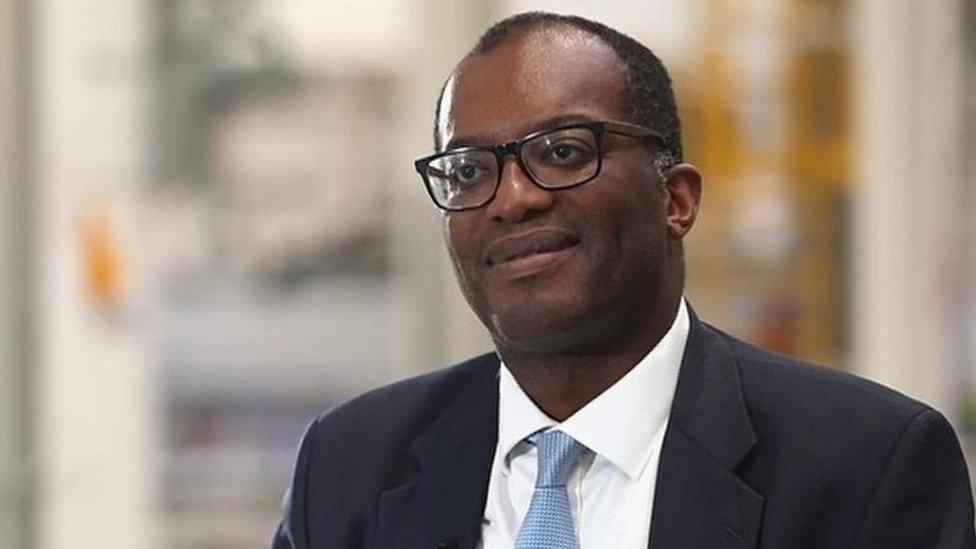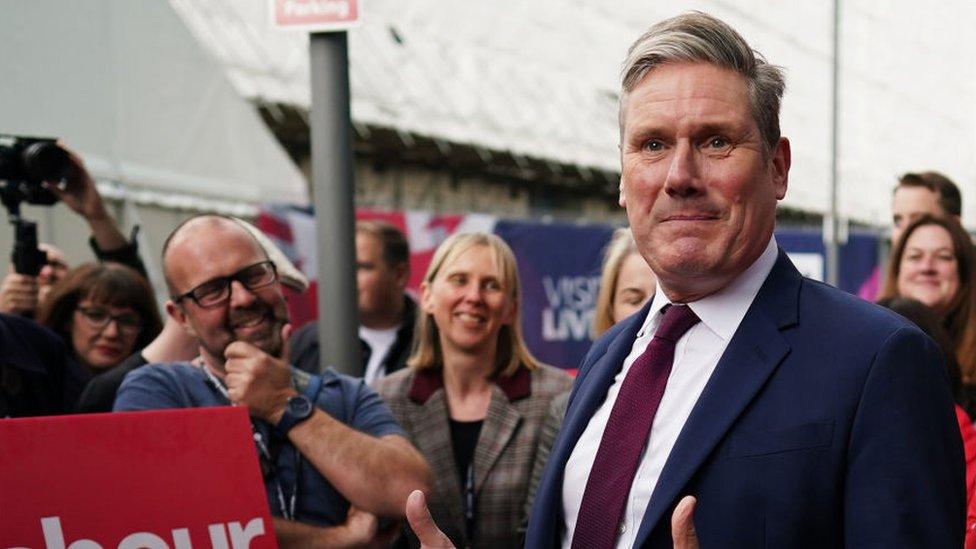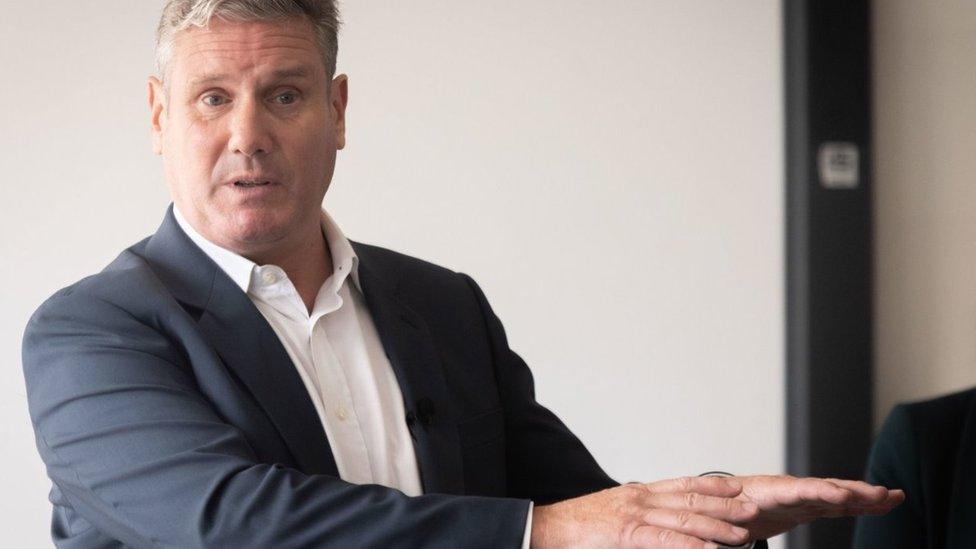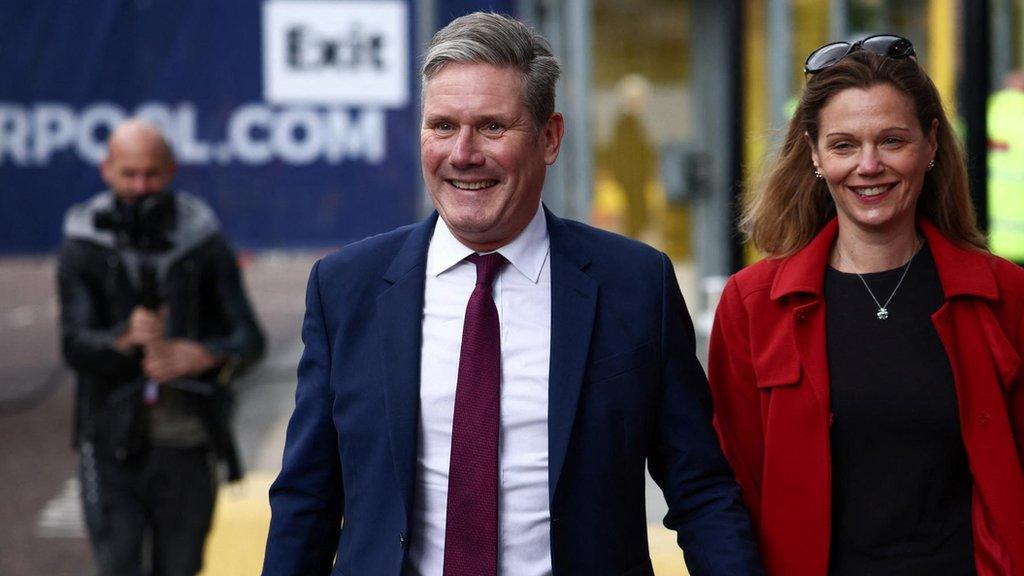Keir Starmer: Labour would reverse cut to top income tax rate
- Published
Sir Keir Starmer tells Laura Kuenssberg that his government would reverse the cut to the top income tax rate
Labour would reverse the government's cut to the top rate of income tax, leader Sir Keir Starmer has said.
He told the BBC the move was "the wrong choice" during a cost-of-living crisis.
But Sir Keir said he supported the decision to cut the basic rate of tax from 20% to 19% as this would "reduce the tax burden on working people".
On Friday Chancellor Kwasi Kwarteng unveiled plans to scrap the higher 45% rate as he set out the biggest package of tax cuts in 50 years.
Sir Keir told the BBC's Sunday With Laura Kuenssberg programme: "I do not think that the choice to have tax cuts for those that are earning hundreds of thousands of pounds is the right choice when our economy is struggling the way it is, working people are struggling in the way they are... that is the wrong choice."
However, on the cut to the basic rate of income tax, he said: "I've long made the argument that we should reduce the tax burden on working people.
"That's why we opposed the national insurance increase earlier this year, which of course the government is now reversing."
But the Labour mayor for Greater Manchester, Andy Burnham, said his party should commit to scrapping income tax cuts to both the basic and top rate.
He told Sky News' Sophy Ridge now "wasn't a time for tax cuts" as it was not the most "targeted" way of helping those most in need.
The chancellor denied his tax cuts favoured those at the top, saying he was "focused on tax cuts across the board".
Mr Kwarteng also suggest there was "more to come".
"We've only been here 19 days. I want to see, over the next year, people retain more of their income because I believe that it's the British people that are going to drive this economy," he told the BBC.
Chancellor Kwasi Kwarteng: "What I'm focused on, is tax cuts across the board"
Sir Keir also said there was now "a belief" that his party would win the next election, with signs some former Labour voters who backed the Conservatives in 2019 were returning.
"Something has happened in the Labour Party this year, which is the hope of a Labour government has turned into a belief in a Labour government," he said.

Starmer feeling more optimistic

Tax looks set to be one of the key political issues in the run up to the next general election.
Labour has criticised the government's priorities, but it doesn't want to junk everything the chancellor announced on Friday.
Sir Keir says if he's in power, he'll reverse the decision to scrap the additional rate paid by those earning more than £150,000.
But he is accepting another part of the government's tax-cutting plan; reducing the basic rate of income tax by a penny from next year.
Labour argues that's necessary because working people are paying too much tax at the moment.
Sir Keir wants the political battle to be over whether it's right to give the highest earners a tax cut at a time when many households are struggling with the cost of living.
The government is adamant it's worth it to grow the economy.
The political battle lines are being drawn.

Asked whether workers should expect their pay to rise in line with inflation, Sir Keir said it was "reasonable" for people to expect their wages to take account of the rising cost of living.
Workers ranging from rail staff to barristers have taken industrial action over pay, with unions calling for pay rises above inflation, which is at a 40-year high of 9.9%.
Pushed whether he would support people going on strike if pay rises did not match inflation, Sir Keir said strikes were "a last resort" and he could understand how people were driven to industrial action when they were struggling to pay their bills.
Sir Keir's shadow transport minister was sacked after joining striking rail workers on a picket line over the summer.
The official line was that Sam Tarry was sacked for "making up policy on the hoof" in an unauthorised media appearance but shadow ministers had been warned not to appear at picket lines.
Asked why he was not more visible on picket lines, Sir Keir said the "most important" thing he could do as party leader was "usher in a Labour government" and his job was different to that of a union leader.
Sir Keir Starmer: "When people go on strike, it is a last resort"
At the start of its party conference in Liverpool, Labour has unveiled plans on green energy and boosting police numbers.
The party said it wanted to make the UK the first major economy in the world to generate all of its electricity without using fossil fuels.
Sir Keir said achieving zero carbon energy by 2030 would be a key priority if his party wins the next election, adding that it was a "difficult" goal but "absolutely doable".
However, he said fossil fuels may be a "fall back" if the target cannot be met by 2030.
The government has already committed to zero carbon electricity by 2035 but Labour believes it can win votes by promoting green energy as a way to generate economic growth, in contrast to Tory tax cuts for the well-off.
In the short-term Labour has backed freezing energy bills for six months to help people cope with the rising cost of living.
The government has committed to a 2-year freeze for household energy bills.
But Sir Keir said his party's plan would be to look at the situation again in April and find a "longer-term answer" to the issue.


Related topics
- Published24 September 2022

- Published24 September 2022

- Published25 September 2022

- Published24 September 2022

- Published24 September 2022
